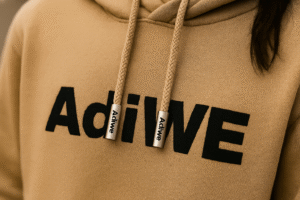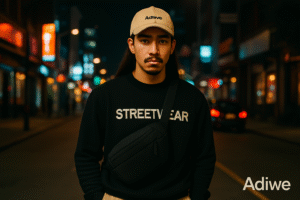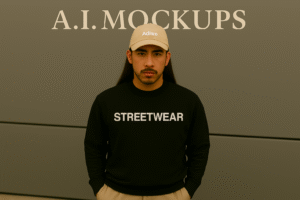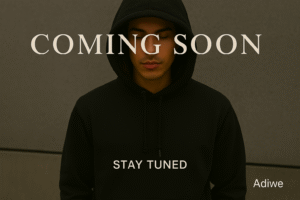Finding the perfect manufacturer feels overwhelming for new streetwear brands. A bad choice can cost you money and derail your launch. Let's simplify this crucial decision.
To choose the right streetwear manufacturer, assess their specialization in streetwear, check their quality control, evaluate their communication, and understand their production capacity. Always start with samples before committing to bulk orders.
Choosing a manufacturing partner is a big deal. It's one of the most important relationships you'll build for your streetwear brand. Get it right, and you have a foundation for success. Get it wrong, and you face delays, quality issues, and wasted investment. As the owner of Adiwe, a factory with five production lines in China, I work B2B with brands across North America, England, and France. We specialize in top-quality, customizable streetwear like t-shirts and hoodies. I've seen what makes a good partnership. Let's explore how you can find the best fit for your vision.
How do I partner with a clothing manufacturer?
Unsure how to start a relationship with a clothing manufacturer? The process can seem confusing and full of potential pitfalls. Let's outline clear steps for a successful partnership.
Partnering with a clothing manufacturer involves clear communication of your designs, detailed tech packs, requesting samples, agreeing on terms (MOQs, pricing, lead times), and establishing quality control protocols. Mutual understanding is key.
!
Building a solid partnership with a clothing manufacturer is more than just placing an order. It's about building trust and understanding. I've worked with many clients, like Fifty Fifty from England, and the best relationships are built on clarity from day one. They are company owners and buyers, so they know what they need.
Initial Research and Due Diligence
First, you need to find potential manufacturers. You can use online platforms like Alibaba, where Adiwe is present, attend trade shows, or get referrals. Once you have a shortlist, do your homework. Check their experience. Do they specialize in streetwear or the types of garments you want to produce (e.g., hoodies, t-shirts)? Look for reviews or testimonials. For clients like K.O.L.s or new trend brands, it's important to see that a manufacturer has experience with current styles and quality expectations. For example, if your designs are complex, like those of Fifty Fifty which require a lot of craftsmanship, you need a factory that can prove they can handle it. Ask them about their main export countries; ours are North America, England, and France, which tells you we understand Western market standards.
Clear Communication and Sampling are Vital
Once you make contact, clear communication is everything. Provide detailed tech packs. These should include precise measurements, fabric specifications, logo placements, artwork files, and details about craftsmanship like stitching types. Don't assume anything. The more detail you give, the better. Before committing to a large order, always, always request samples. This is where you see their actual work quality and if they can bring your personalized design to life. For Fifty Fifty, whose primary purchase is hoodies, seeing a perfectly executed sample that matches their design and quality expectations is non-negotiable. This step often reveals if a manufacturer can truly reproduce complex styles.
Agreeing on Terms and Building the Relationship
If the samples meet your standards, the next step is discussing terms. This includes Minimum Order Quantities (MOQs), pricing per unit, payment terms, and production lead times. Be clear about your quality control expectations and processes. How will they ensure consistency across the batch? What happens if there are defects? Having a written agreement is crucial. Remember, this is a partnership. Good manufacturers, like us at Adiwe, want your brand to succeed. We offer wholesale only, so your success is our success. We focus on building long-term relationships by delivering top quality and understanding our clients' needs for customizable fabrics and trendy products.
| Partnership Step | Key Action | Why It's Important for Streetwear |
|---|---|---|
| 1. Research | Find specialists, check reviews, ask questions | Ensures they understand streetwear nuances |
| 2. Tech Packs | Provide detailed design specifications | Minimizes errors, ensures design accuracy |
| 3. Sampling | Order and approve physical samples | Validates quality and capability |
| 4. Define Terms | Agree on MOQ, price, lead time, QC, payment | Sets clear expectations for both parties |
| 5. Communication | Maintain open and regular contact | Facilitates smooth production & problem-solving |
What makes a streetwear brand?
Confused about what truly defines "streetwear"? Many use the term loosely, but authentic streetwear has distinct characteristics. Understanding these is key to building a genuine brand.
A streetwear brand is defined by its authenticity, connection to subcultures (like skate, hip-hop), emphasis on graphic t-shirts and hoodies, often limited drops, and a strong community focus. Quality and unique design are paramount.
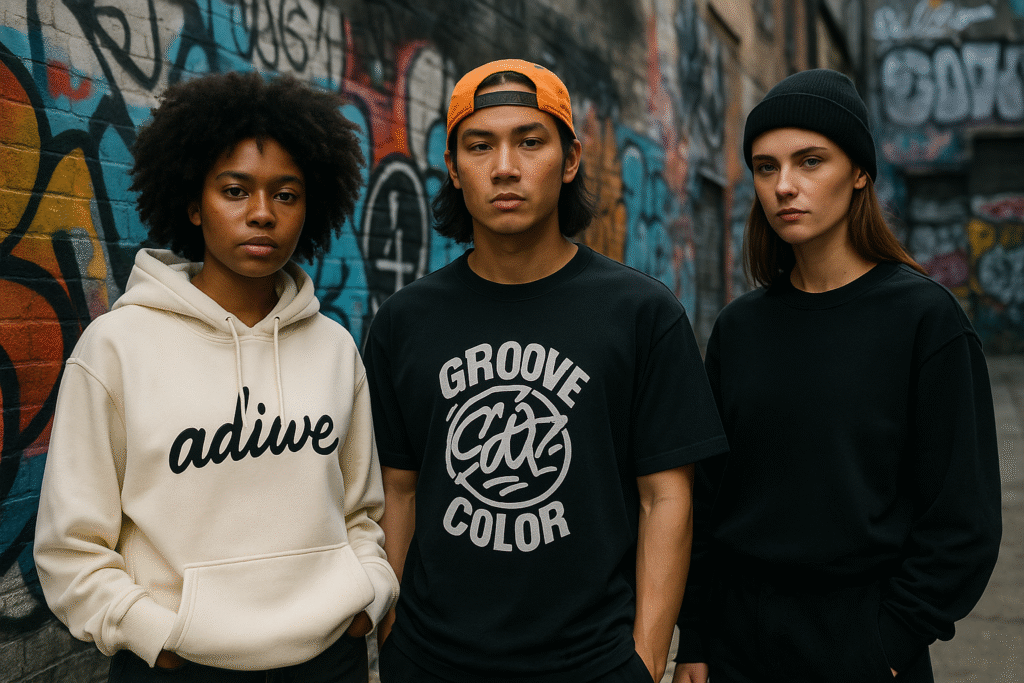
Streetwear is more than just casual clothing. It's a cultural movement. As a manufacturer for many trend brands and K.O.L.s, I see how important it is for them to capture this essence. It's not just about printing a logo on a t-shirt; it's about conveying an identity.
Authenticity and Cultural Roots
At its heart, streetwear is about authenticity. It often draws inspiration from various subcultures like skateboarding, surfing, hip-hop, and punk. It’s about self-expression and being part of a community. A successful streetwear brand usually has a genuine connection to one or more of these cultures. It's not just about aesthetics; it's about the story and the values the brand represents. For example, a client looking to create a skate-inspired line needs to understand that culture deeply, not just copy popular motifs. This authenticity resonates with the target audience, often young people who value genuine connection over mass-produced fashion.
Design Language and Product Focus
The visual identity of streetwear is crucial. Graphics play a huge role, often bold and thought-provoking, on items like t-shirts and hoodies – which are staples. Fit is also important, often leaning towards relaxed or oversized silhouettes. Quality is increasingly a differentiator. While early streetwear might have been more DIY, today's successful brands, like the ones Fifty Fifty aims to build, focus on top quality materials and construction. This includes customizable fabrics and unique craftsmanship for logos and accessories. Limited edition drops or "exclusivity" also play a part, creating hype and desirability. This makes the products feel more special and sought-after.
Brand Story and Community Building
A strong streetwear brand tells a story. It has a clear point of view and connects with its audience on an emotional level. It's not just about selling clothes; it's about building a tribe. Social media is often a key channel for this, allowing brands to interact directly with their followers and create a sense of belonging. For example, a K.O.L. launching their own line leverages their existing community and personal brand story. The clothing becomes a physical extension of their identity and message. This is why personalized design is so important; it allows the brand's unique voice to shine through.
| Streetwear Element | Description | Importance for Manufacturers Like Adiwe |
|---|---|---|
| Authenticity | Genuine connection to culture/community | Understanding client's vision for true representation |
| Graphics & Design | Bold, expressive visuals, unique silhouettes | Capability for complex, high-quality prints/embroidery |
| Core Garments | T-shirts, hoodies, caps are central | Specialization in producing these items to high standards |
| Quality Focus | Durable materials, good construction, custom details | Sourcing top materials, advanced craftsmanship |
| Community/Story | Engaging with audience, strong brand narrative | Helping brands express their identity through product |
What is the best manufacturer for clothing?
Everyone wants the "best" manufacturer, but what does that truly mean? The definition of "best" can change based on your specific needs. Let's clarify how to find your best.
The "best" clothing manufacturer is one that aligns with your brand's specific needs regarding product type, quality standards, volume, price point, and communication style. There's no single "best" for everyone.
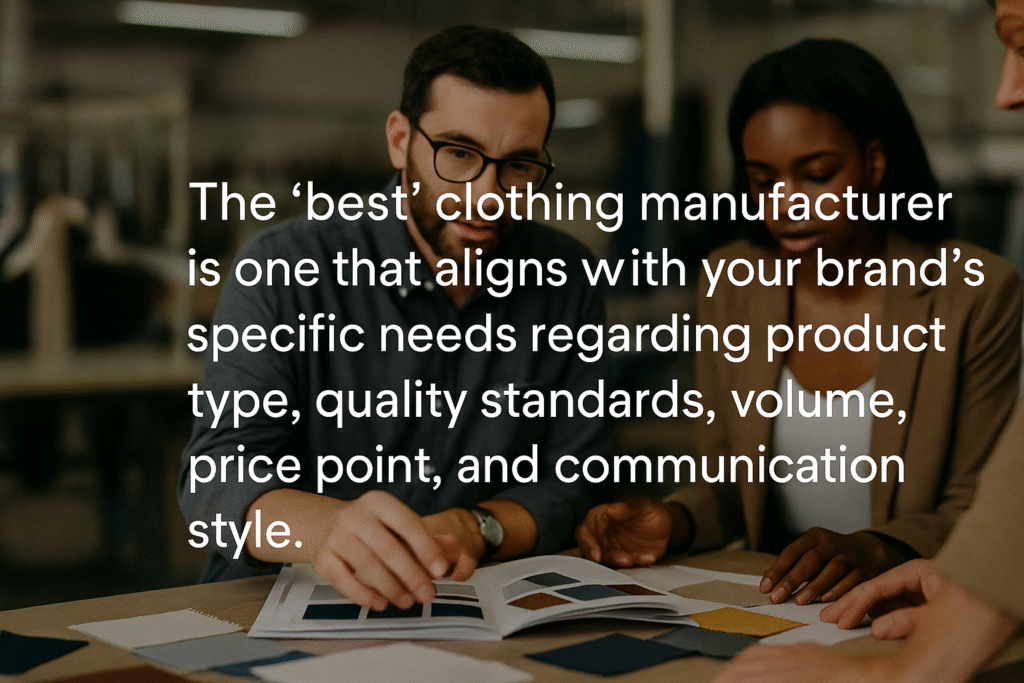
factory, I know that "best" is relative. What makes Adiwe the best choice for one streetwear brand might not be the same for a fast-fashion retailer or a luxury couturier. The key is finding the manufacturer that is best for you. My client, Fifty Fifty, looks for design replication, quality, and competitive pricing for their hoodies, often sourced from China.
Specialization and Expertise
The first thing to consider is specialization. Does the manufacturer have experience producing the specific types of garments your streetwear brand will focus on? If you're making high-quality hoodies with complex embroidery, like many of my clients, you need a factory that excels in that. A factory that primarily makes simple, high-volume t-shirts might not have the machinery or the skilled labor for intricate details or specialized fabrics. At Adiwe, our focus is on streetwear – t-shirts, hoodies – with options for personalized design, customizable fabrics, and various craftsmanship techniques. We understand the trendy aesthetics and quality expectations of markets in North America and Europe.
Quality Control and Compliance
Quality is non-negotiable, especially in streetwear where perceived value is high. What are the manufacturer's quality control (QC) processes? How do they ensure consistency? Do they have any certifications (e.g., ISO, WRAP)? Ask about their inspection stages. For clients like Fifty Fifty, who find that many manufacturers can't fully reproduce their designs, this is a critical point. They look for suppliers through trade shows and Google searches, and quality control, along with logistics and payment methods, are key sourcing points. We ensure our five production lines adhere to strict quality checks because we know this is vital for our B2B clients.
Capacity, Scalability, and Reliability
Consider the manufacturer's production capacity. Can they handle your current order volume and, importantly, can they scale with you as your brand grows? Reliability is also huge. Can they meet deadlines? Consistent delays can kill a new brand. Ask for their average lead times and how they manage production scheduling. For a trend brand, getting products to market on time to catch a wave is crucial. We work with clients from K.O.L.s who might start with smaller, more frequent orders, to established clothing brands needing larger, consistent production. Our factory status with multiple lines allows for this flexibility. Ultimately, the "best" manufacturer is a reliable partner committed to your success.
| Factor to Consider | Question to Ask Manufacturer | Why It Matters for Your Streetwear Brand |
|---|---|---|
| Specialization | "Do you specialize in streetwear/hoodies/complex designs?" | Ensures they have relevant expertise and machinery. |
| Quality Control | "What are your QC procedures? Can I see your certifications?" | Guarantees product quality and consistency. |
| MOQs & Pricing | "What are your MOQs? Can I get a price list for X units?" | Determines if they fit your budget and scale. |
| Lead Times | "What is your average production lead time for my products?" | Crucial for planning launches and inventory. |
| Communication | "Who will be my main point of contact? How often will we communicate?" | Ensures clarity and quick issue resolution. |
| References | "Can you provide references from similar brands you work with?" | Offers social proof of their reliability and quality. |
Conclusion
Choosing the right manufacturer involves research, clear communication, and aligning their strengths with your streetwear brand's unique needs. This partnership is key to your brand's quality and success.

